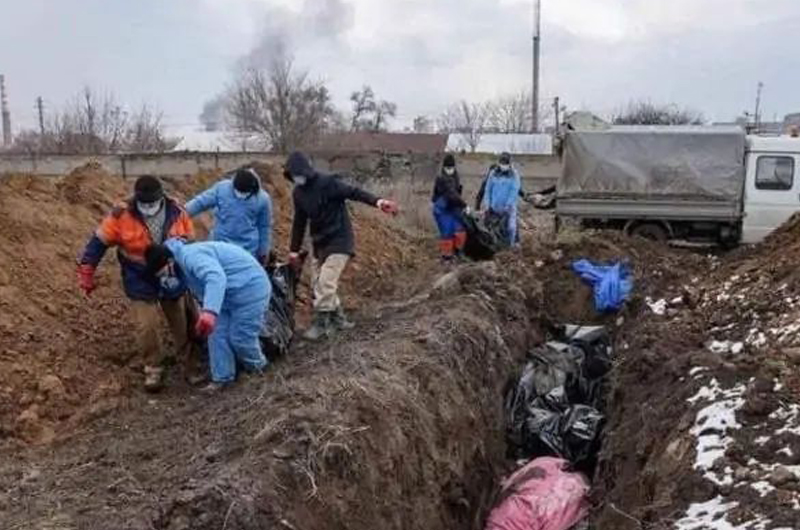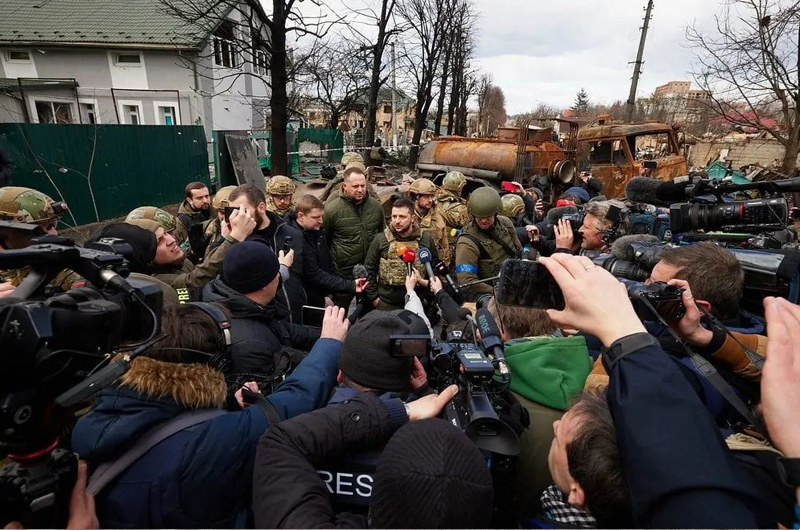As the war in Ukraine continues, the devastation and human cost of the conflict is mounting. But as well as the human toll, there has been a terrifying assault on democratic values such as freedom of the press. Journalists and human rights defenders in both Ukraine and Russia are facing enormous challenges and independent voices are being stifled, Aidan White points out
In Russia, free speech is being systematically extinguished as independent media is closed down and critical reporters are forced to flee the country. In Ukraine, the local media community is fighting a courageous battle for truth-telling in wartime conditions while standing up for press freedom. Everywhere propaganda and censorship have thrown a cloak of secrecy over the most dangerous conflict to break out in Europe since the Second World War.
In this context, the Ethical Journalism Network (EJN), with the support of the Evens Foundation, has commissioned a series of articles about the ethical challenges facing journalists covering this war – in Ukraine, Russia and around the world. Experts and journalists will write about the ethical challenges of reporting conflict zones; the Ukrainian journalists struggling for impartiality; the courageous resistance of journalists in Russia; and the impact of social media and disinformation on coverage of the conflict.
This series will highlight the importance to news media of the five core values of professional journalism as an antidote to propaganda and censorship. These are:
- accuracy and fact-based reporting
- independence
- impartiality
- humanity and respect for others
- accountability and responsible reporting
It can be a struggle to maintain these values at the best of times and is even more difficult during war, when combatants on all sides demonise their opponents and turn to malicious lies and propaganda to win over public opinion. All journalists reporting the war in Ukraine are facing an ethical struggle to tell the story of the conflict in a fair, unbiased and accurate way.
Several storylines have emerged since the Russian invasion which demonstrate the challenges facing news media. One of the most important concerns is the many allegations of war crimes being committed. The International Criminal Court (ICC) has sent a team of investigators and forensics experts to Ukraine which it describes as a “crime scene”.

Ukraine is conducting its own investigations and has said it is examining 21,000 war crimes and crimes of aggression allegedly committed by Russian forces since the start of the invasion in February. On its side, Moscow has charged 92 members of the Ukrainian armed forces with crimes against humanity. Russia is also investigating suspected mercenaries from the UK, the US, Canada, the Netherlands and Georgia. All sides strongly deny committing war crimes, with Russia even blaming Ukraine for targeting its own civilians and shelling its own infrastructure.
Making sense and truth-telling in this confused situation, which is heavily influenced by untested intelligence and blatant propaganda, is an important job for Ukrainian and Russian journalists. Verifying the claims and counterclaims with testimony from the field, talking with victims and eyewitnesses and only using reliable and trustworthy sources of information is essential.
In particular, journalists must cast a sceptical eye over the claims of official sources. However, fully testing the claims and counterclaims may have to wait until a ceasefire.
The refugee crisis that developed almost immediately after the invasion is another important story with many ethical pitfalls. Around six million Ukrainians have fled, according to the United Nations High Commissioner for Refugees, in what has been Europe’s largest refugee crisis in almost 80 years.
Countries across Europe and particularly neighbouring states like the Czech Republic, Poland, Romania and Slovakia have opened their borders and offered shelter and financial aid to those fleeing the war. Many Ukrainians have also fled to Germany, France and the UK. European countries have welcomed the displaced Ukrainians with open arms, with visa-free access and permission to access jobs and social services.
But hostility towards refugees, particularly in certain countries of Eastern Europe, has begun to emerge. Rampant inflation is now fuelling a less-welcoming climate. From Warsaw to Bucharest, social networks are flooded with outraged posts showing, with context, luxury cars registered in Ukraine and prosperous individuals waiting for their allowances in front of administrative buildings.
“A typical distortion in the Czech Republic, one of the neighbouring countries in the forefront of hosting refugees, falsely alleged that a Ukrainian family could accumulate up to 90,000 crowns (3,700 euros) in public aid, more than the income of many Czech families.” The ethical telling of the refugee story requires journalists to avoid bias, rumour and speculation, to be wary of social networks and internet noise, and to focus on evidence and verifiable facts.
Most refugee agencies and economic data reveal that, like most migrants and refugees, Ukrainians look for work to pay their way when they arrive in new countries. Journalists also need to be alert to the fact that anti-Ukrainian sentiment is a hallmark of Russian propaganda.
Another angle to this story is the contrasting way Europe responded to the refugee crisis in 2015, when more than a million people from Syria, Afghanistan and elsewhere crossed into Europe. Countries responded by tightening borders and negotiating a deal with Turkey to stem arrivals.
Journalists have been quick to show that the crisis in Ukraine differs from other conflicts. A CBS correspondent described Kyiv as unlike Iraq or Afghanistan, calling it “a relatively civilised, relatively European” city. Europeans see Ukrainians as white and Christian. There are also cultural similarities and a common history with neighbouring countries like Poland.
It’s important for ethical journalists to understand these nuances and the historical context and to be aware of how politicians, such as Hungary’s Viktor Organ, may seek to use these differences to divide communities. Above all, they must avoid perpetuating the image of people from the Middle East, or sub-Saharan Africa as “others” escaping distant conflicts and suggesting, therefore, that their plight is less worthy of shock and empathy.
In 2015, European and North American journalists worried about whether to use the term “migrant” or “refugee” about the new arrivals. This has not been an issue with Ukrainians. Governments and the media immediately called them refugees and have continued to do so. Such labels are consequential and influence public opinion. In general, people hold more positive attitudes toward those forced to flee for political reasons compared with those moving for economic opportunities. Some see refugees as more deserving of support than migrants.
Journalists need to be cautious about how they report these issues. Providing background is vital but consistency and the ethic of humanity in reporting require news media to avoid reporting that which deliberately seeks to portray some refugees and migrants positively and others from the Mediterranean and the Global South in a negative light.
Another continuing storyline that has emerged from the war is the struggle for press freedom and independent journalism inside Russia and Ukraine. Before the war, the EJN compiled a report on the problems facing media in Ukraine. It found that most mainstream television stations, radios and online outlets were controlled by oligarchs whose support could make or break politicians and who had no interested in balanced and ethical journalism, or reporting that was sensitive to women and minorities.
These oligarch stations were the most popular in Ukraine as their well-funded programming looked highly professional. Before the war, Ukrainians who wanted a balanced picture of what was happening in their country had to channel surf between stations or turn to small, independent websites and radios funded by the international community or crowdfunding campaigns. This independent media scene was vibrant but always threatened by lack of money and a limited audience. With questions marks over the independence of the public broadcaster, Ukrainians tended to distrust media and were vulnerable to the flood of disinformation coming from Russia.
Disinformation sent via Telegram and Facebook was particularly prevalent in early 2022 prior to the February invasion as Russia amassed troops on the border. Despite the war, Ukraine journalists are continuing to strive to improve the media situation in the country. In July, the two major journalists’ groups, the National Union of Journalists of Ukraine and the Independent Media Trade Union of Ukraine, urged the authorities to bring media regulation into line with European standards of press freedom. The two groups, with the support of the European Federation of Journalists, welcomed the decision of the European Union to grant Ukraine the status of an EU candidate country and used the moment to highlight how the country’s current media law is out of step with European standards.
The Ukraine parliament is considering a draft media law introduced two years ago, but journalists say many of the provisions are contrary to European values. They cite how the new law would give arbitrary and disproportionate regulatory powers covering all media to the national regulator, the National Council on Broadcasting.
“The coercive regulation envisaged by the bill and in the hands of a regulator totally controlled by the government is worthy of the worst authoritarian regimes,” said EFJ general secretary Ricardo Gutiérrez. “It must be withdrawn.”
In Russia, the situation is far worse. The life of independent journalists in Russia has already been made impossible with the introduction of new laws that can lead to jail for up to 15 years for any journalist or independent activist who criticises the war, the army or government policy over its “military operation in Ukraine”. Even use of the terms “war” or “invasion” has been forbidden by the media regulator.
The Independent Media Trade Union in Russia has been suppressed and the Russian Union of Journalists has been steadfast in its lack of resistance to government pressure. Not surprisingly, in the absence of institutional resistance to their situation, dozens of journalists have fled the country and those inside are forced into silence with only the occasional voice of resistance being heard through isolated podcasts or social media posts.
All of these issues – reporting the war itself, investigating the complex questions of war crimes and the refugee crisis, and reporting on internal struggles for free speech – illustrate the ethical and professional dilemmas facing journalists.
How news media do their work in these difficult conditions impacts public opinion and may even exert some ifnluence on the war and its aftermath. In particular, journalists can demonstrate, by attachment to independent journalism and the five core values of the EJN, that media freedom is an essential part of the enabling environment needed for peace, democracy and respect for human rights.
Over the coming months we will focus on the importance of this work and in the process underscore why ethics matter in telling the story of Ukraine both now and for the future.
Note: This article first appeared on the The Ethical Journalism Network (EJN) website and was republished by Wan-IFRA with permission. It was amended on August 25 to correct an error. The Czech Republic does not have the highest intake per capita of Ukraine refugees in Europe, that is Moldova. Further details can be found at https://www.theguardian.com/uk-news/2022/jun/03/uk-takes-in-fewer-ukrainians-per-capita-than-most-of-europe
With the support of the Evens Foundation, EJN has commissioned a series of articles about the ethical challenges facing journalists covering this war – in Ukraine, Russia and around the world. This series follows the recent publication of media landscape reports – Building Trust in Journalism in Central Eastern Europe’‘ – on Bulgaria, Czech Republic, Georgia, Hungary, Poland and Slovakia.
(By special arrangement with WAN-IFRA. The writer is the founder and honorary president of the Ethical Journalism Network/ EJN.)



 from Webdoux
from Webdoux